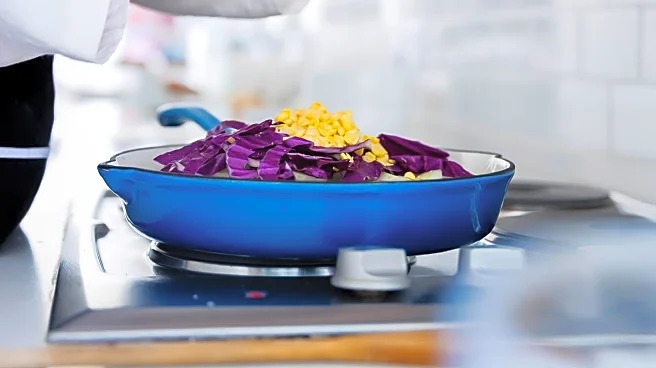What's Happening?
Meal kit delivery services, such as Blue Apron and HelloFresh, are gaining popularity as convenient alternatives to traditional grocery shopping. These services provide pre-portioned ingredients and easy-to-follow
recipes delivered directly to consumers' doors. Blue Apron has recently updated its service to allow customers to order meals à la carte, eliminating the need for a subscription. This change addresses a common concern among consumers about subscription commitments. Both Blue Apron and HelloFresh offer a wide variety of meal options, including pre-made and ready-to-bake meals, with Blue Apron also introducing a subscription model called Blue Apron Plus, which offers free shipping and additional perks.
Why It's Important?
The rise of meal kit services like Blue Apron and HelloFresh reflects a shift in consumer behavior towards convenience and time-saving solutions in meal preparation. These services cater to various dietary needs and preferences, offering flexibility and reducing food waste by providing pre-portioned ingredients. The ability to order meals without a subscription may attract more consumers who are hesitant about long-term commitments. This trend could impact traditional grocery stores as consumers opt for the convenience of home-delivered meal kits. Additionally, the focus on eco-friendly packaging by companies like Blue Apron addresses growing consumer concerns about environmental sustainability.
What's Next?
As meal kit services continue to evolve, they may further expand their offerings to include more diverse and customizable meal options. Companies might also enhance their sustainability efforts by improving packaging and sourcing practices. The competition between meal kit providers could lead to more innovative solutions and pricing strategies to attract and retain customers. Traditional grocery stores may need to adapt by offering similar convenience-focused services or enhancing their in-store experiences to compete with the growing popularity of meal kits.
Beyond the Headlines
The meal kit industry is not only transforming how people cook and eat but also influencing broader food industry trends. The focus on reducing food waste and providing sustainable packaging aligns with increasing consumer demand for environmentally responsible products. Additionally, meal kits can serve as a gateway for individuals to explore new cuisines and cooking techniques, potentially leading to a more diverse culinary landscape. As these services become more mainstream, they may also play a role in shaping future food policies and regulations related to food safety, sustainability, and consumer protection.









